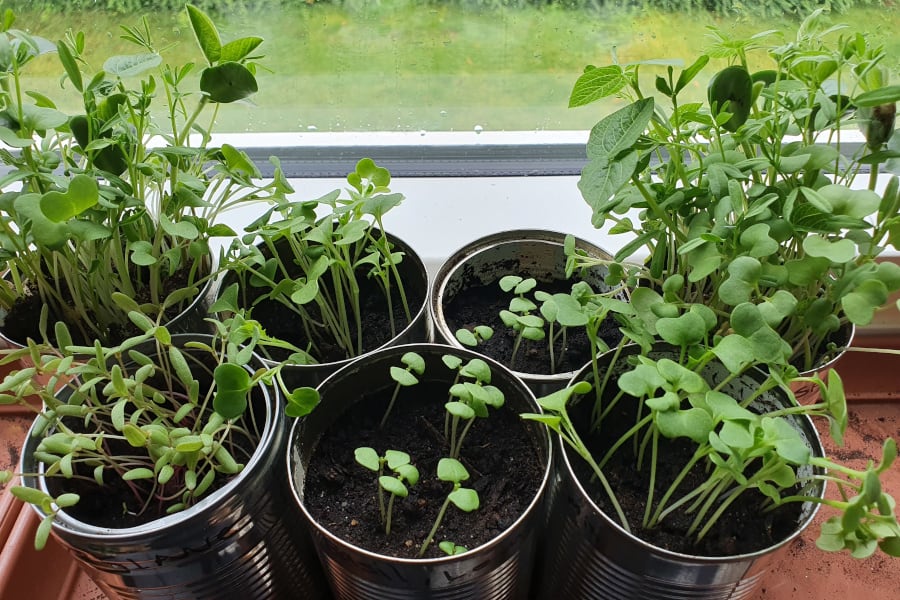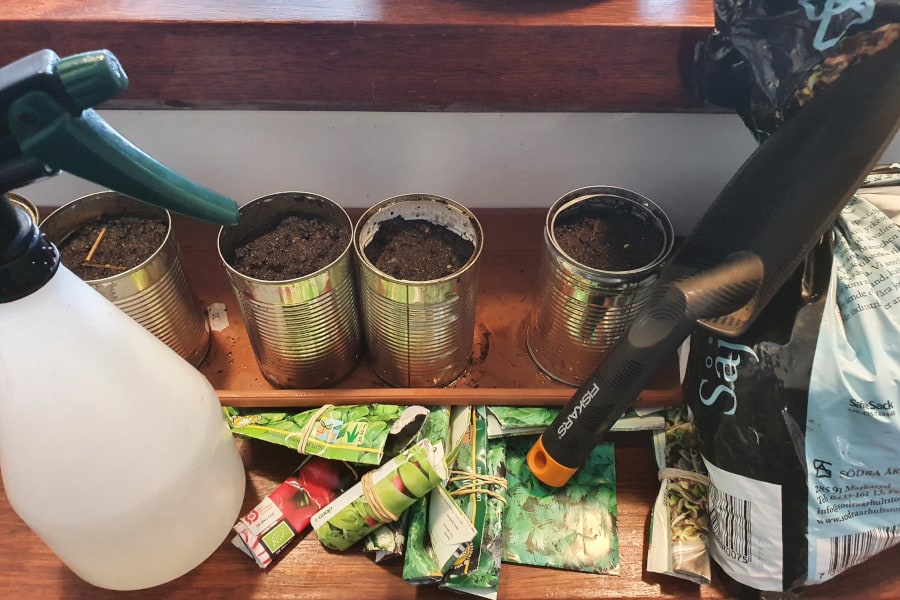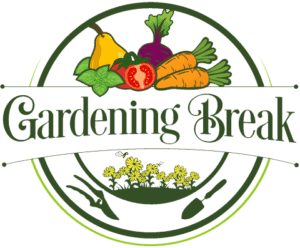
Growing plants in a tin can is fun and can save you both money and space, and while tin cans are too small for growing certain plants, there are so many plants that actually grow really well in a can.
To give you the best answer to what plants you can grow in a can, I first visited two different plant nurseries and asked some of the gardeners there for some tips. After that, I chose 5 different plants to grow in cans to see exactly how well it works. It worked extremely well, and along the way, I learned several useful tips for growing plants in tin cans that I have also shared in this post.
Here is a list of garden plants that can be grown in a can.
- Spinach
- Lettuce
- Strawberries
- Basil
- Salad greens
- Rosemary
- Thyme
- Chives
- Mint
- Spring onion
- Tomatoes (determinate varieties)
- Peppers
- Chili
- Bok choy
- Beans
- Sugar snap peas
- Sprouts
- Purslane
- Garden cress
- Parsley
- Coriander
- Oregano
- Lemon balm
- Lemon grass
- Dill
- Sage
Many plants won’t grow well in a can simply due to their size, but as you can see, there are also many plants, including some surprising ones, that can grow extremely well in a can. This list includes many plants that will do well if grown in a can, but it is by no means an exhaustive list, so it can be very beneficial for you to know how you can determine if a certain plant will grow well in a can.
Below, I explain how you can know in advance if a certain plant can be grown in a can.
What Plants Can You Grow in a Can?
If done properly, tin cans can work really well as containers for growing plants. The only thing that limits what you can grow in them is their size.
Before writing this post, I wanted to try growing plants in cans myself, and before doing that, I wanted to get some advice from gardeners with more experience than myself, so first, I visited a nearby plant nursery and then a larger garden center because I wanted to talk to some different people. They all had great suggestions for what plants to grow and they all agreed that most plants would actually grow quite well in a can.
Most garden plants can be grown in a can, but lettuce, spinach, and herbs work especially well. Root vegetables, very large plants, or plants with extensive root systems will not grow well in a can since the size of the container will inhibit their ability to grow.
The two most important things you have to keep in mind when considering if a certain plant can be grown in a can are the root system’s size and the actual plant’s size. You can easily find this information online.
It is also important that you make some holes in the cans for drainage. I get into this and some more tips in just a bit.
Tin cans are usually relatively small, so there is limited room for root systems to grow, which can inhibit the plants’ ability to grow and produce. However, this is only an issue if the plant cannot obtain the nutrients and water it needs. So while limited room for roots is generally not a good thing, it is not necessarily a bad thing either.
If you want to grow tomatoes, peppers, peas, and similar, it is best to go after some relatively small varieties that do not require as much soil to soil to grow in as some of the larger varieties.
With tomatoes, I recommend picking a determinate variety since it won’t get as large as an indeterminate one. You can start with just one tomato plant and then take some cuttings from it to grow many more. I have written another post that explains how you can do that, which you can find on this link.
I personally ended up growing spinach, basil (lemon variety), salad greens, purslane, and a mix of different sprouts. All the plants I grew in cans did really well. You can see some of them in the photo at the top of this post.
If you are looking for some inspiration for other plants you can grow in small spaces, I recommend that you read this article where I cover 43 edible plants you can grow in small spaces. Not all of them will fit in tin cans, but some of them definitely will.
As I grew plants in tin cans myself, I learned several useful things that can make it much easier and more efficient for you. I share those tips below.
Tips For Growing Garden Plants in a Can

If you prepare tin cans properly, they can work just as well for growing plants as other containers. Luckily, preparing them is very easy and does not take long.
Tin cans can have some really sharp edges, and when I prepared them, I quickly learned that it is a great idea to smoothen them. Of course, I learned it the hard way by cutting my finger, so you don’t need to do the same. Instead, use a file to smoothen the edges before doing anything else.
When preparing tin cans for growing plants, the most important thing you have to do is make some holes. The purpose of the holes is to provide good drainage and thereby reduce the risk of root rot. If there is no way for the water to run through, the risk of the roots rotting is significantly higher.
I have written a step-by-step guide that explains how you can grow plants in cans, including how to prepare the cans. I have taken photos of every step of the way, so it is easy to follow. You can find that post here.
Below, I get into some of the advantages and disadvantages of growing plants in cans.
Advantages of Growing Plants in a Can
Other than being fun, there are also some more tangible advantages of growing plants in cans.
Growing plants in tin cans is a cost-effective and space-saving way of growing plants. Using them as containers for growing plants is a great way to recycle used tin cans and can essentially eliminate the need for pots or containers. Since the sides of tin cans are usually vertical, they can also be placed close together.
Like other pots and containers, tin cans are really easy to move around, so if some of your plants are not getting enough sun (or too much), you can easily move them somewhere else.
Tin cans are great for growing plants, but there are also some disadvantages you should know about.
Disadvantages of Growing Plants in a Can
In my opinion, there are mostly advantages associated with growing plants in tin cans, but there are some things you should be aware of.
The primary disadvantage of growing plants in tin cans is the size of the cans. Most tin cans are relatively small compared to regular plant pots or containers, so root vegetables, large plants, or plants with large root systems will not grow well in them.
Depending on what you want to grow, tin cans may not be the best choice for you, but if you like spinach, lettuce, herbs, and other garden plants with relatively small root systems, there are many options.
If you are looking for ways to grow food in small spaces, using tin cans is a fun method, but there are a lot of other things you can do too. I have written this article, where I share 16 tricks I have used to grow a lot of food in a small space.

